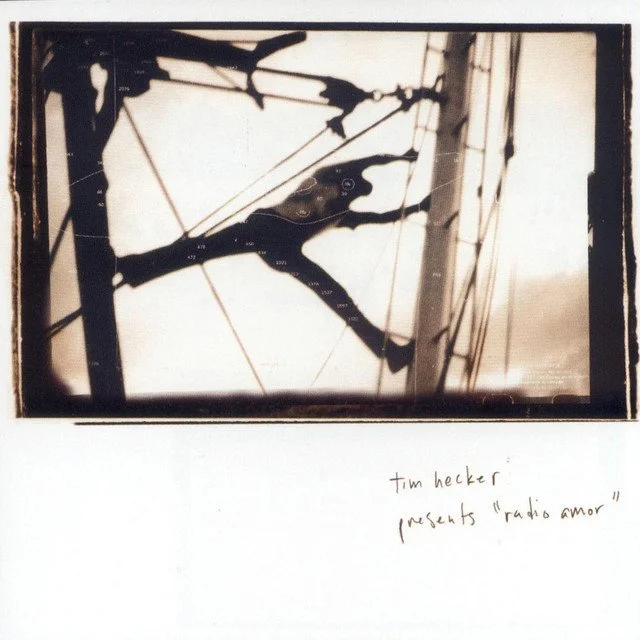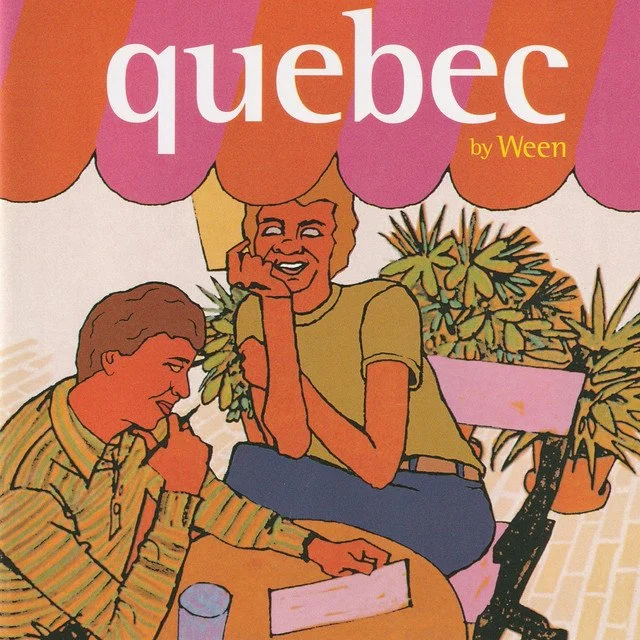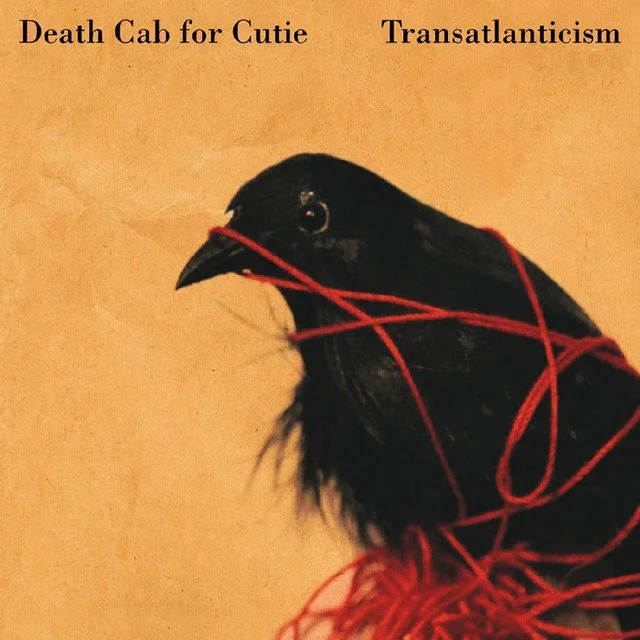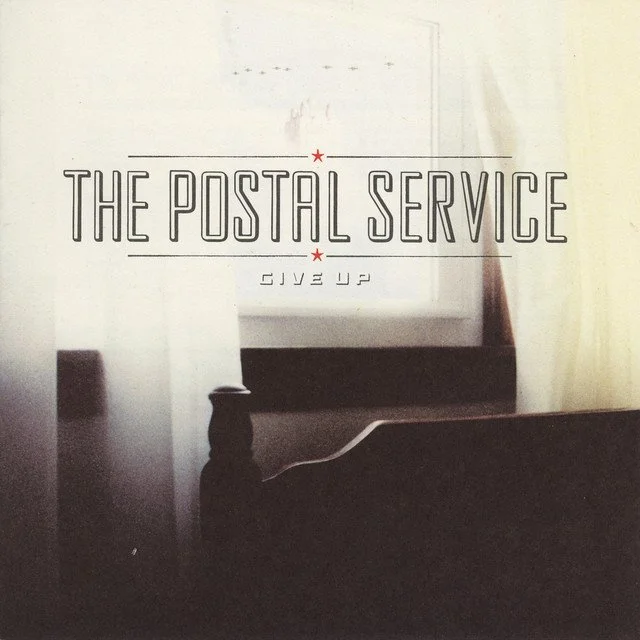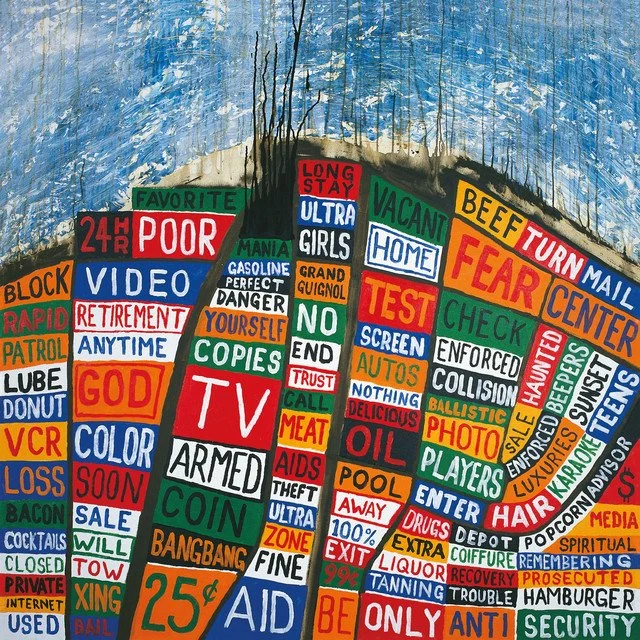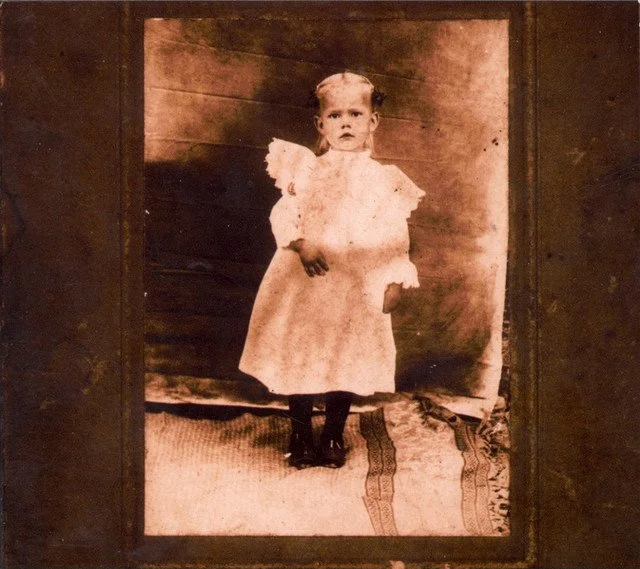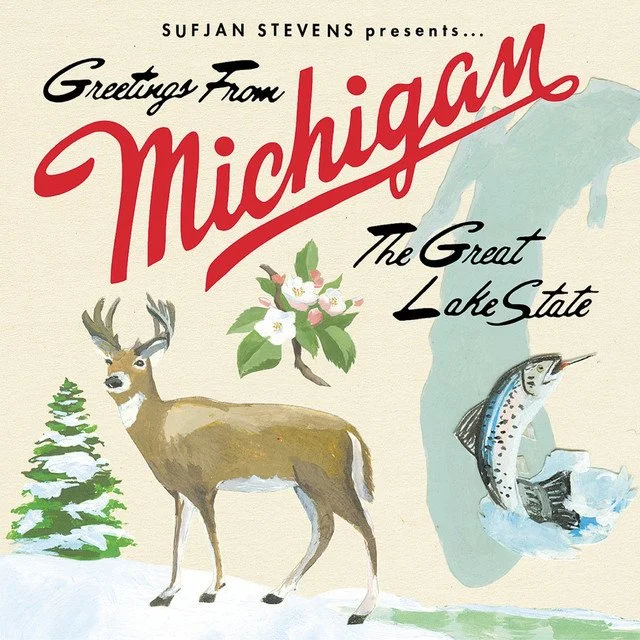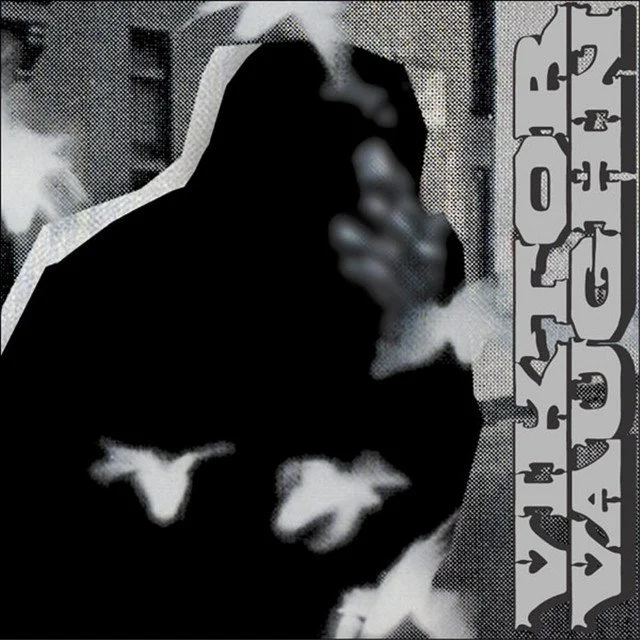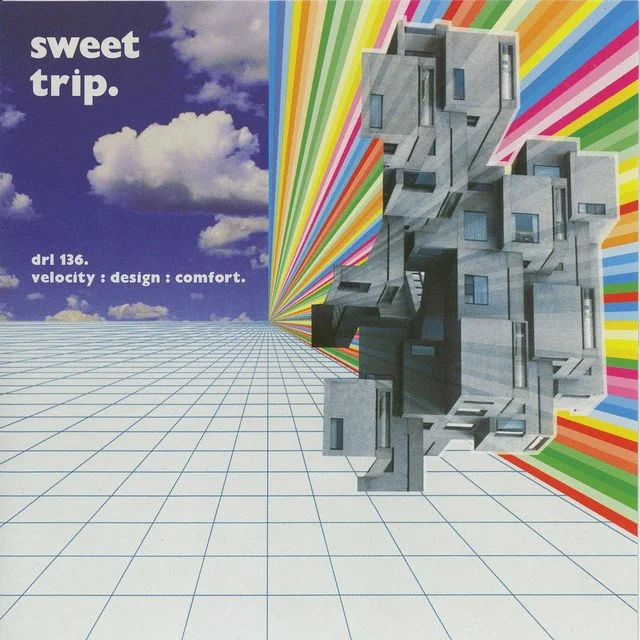2003 - Clive's Top Albums of Every Year Challenge
Since 2020, I’ve been ranking and reviewing the top 5 albums - plus a fair few extras - according to users on rateyourmusic.com (think IMDB for music) from every year from 1960 to the present. If you want to know more, I wrote an introduction to the ‘challenge’ here. You can also read all the other entries I’ve written so far by heading to the lovely index page here.
Welcome to 2003, the year Britain and the US launched the war on Iraq, Libya accepted responsibility for the Lockerbie bombing and agreed to pay $2.7 billion to the victims’ families, and Schwarzenegger was elected governor. Here’s the year’s top 5 albums according to our ever-reliable rateyourmusic.com users:
#1 Sweet Trip - Velocity: Design: Comfort
#2 Songs: Ohia - The Magnolia Electric Co
#3 Boris - Feedbacker
#4 The Microphones - Mount Eerie
#5 Ween - Quebec
And some more I feel the need to grab from further down the list:
#6 Sheena Ringo - Kalk Samen Kuri no Hana
#7 Viktor Vaughn - Vaudeville Villain
#8 Sun Kil Moon - Ghosts of the Great Highway
#11 Tim Hecker - Radio Amor
#17 Sufjan Stevens - Michigan
#20 The Postal Service - Give Up
#25 Radiohead - Hail to the Thief
#30 The White Stripes - Elephant
That’s 13 albums - let’s get cracking.
13. Kalk Samen Kuri no Hana
Sheena Ringo
“Kalk Samen Kuri no Hana, also known as Kalk Samen Chestnut Flower and Chlorine, Semen, Chestnut Flower is the third studio album by Japanese singer-songwriter Ringo Sheena. The album's lead single was a massive success, topping the Oricon charts for the first time in her career.” - Wikipedia
Even without grasping a single word, it’s obvious the lyrics matter here—and that language barrier does feel like a bit of a wall. Still, Kalk Samen Kuri no Hana bursts with so much sonic invention that it’s hard not to be drawn in. It’s a chaotic, brilliant collage of styles—classical strings, glitchy electronics, jazz, prog, all tumbling into one another—and somehow, it remains engaging throughout. Cohesion might be elusive, but it’s clearly a triumph of creativity. The production still has a lo-fi edge, and I’d love to hear this with a bit more space to breathe, but it’s already a step up from the more confined, tinny feel of her 2001 release.
Even if I can’t follow the story, I’m still glad to be along for the ride.
7.5/10
12. Radio Amor
Tim Hecker
“Radio Amor was inspired by Jimmy, a fisherman and shrimper that Hecker met during a visit to Honduras in the mid-1990s. In an article from The Wire, Hecker said that "I was totally obsessed with the idea of fishermen in the Caribbean".” - Wikipedia
Radio Amor feels like music composed by the wind—shifting, ghostly, and elusive. While it’s clearly the product of sequencers and electronics, there’s a natural, almost elemental quality to its flow, as if it was born from weather rather than machines. There’s a haunting undercurrent throughout, something quietly ominous beneath the distortion and static. Knowing it’s inspired by a Honduran shrimper adds a strange poetry to the listening experience, though without the track titles and cover art, you’d never guess it. I was intrigued by its textures and drift, even if I never fully lost myself in it.
8/10
11. Quebec
Ween
“Quebec is the eighth studio album by the American rock band Ween. It was the first album released after the band's contract with Elektra expired, and marked its return to independent labels. Recorded during a period of strife in the band members' personal lives, Quebec was described by Dean Ween as a ‘very negative’ album that takes on a darker tone compared to the band's prior work.” - Wikipedia
I listened to this in bed before sleep, and Quebec had me double-checking that the tablet I took was magnesium, not something hallucinogenic. Ween are singular - singularly mad. Quebec ricochets between genres with zero concern for cohesion, it feels like a cracked mirror of the band’s inner turmoil at the time, their sadness cloaked in absurdity and smirking pastiche. It’s playful, unhinged, and oddly poignant.
8/10
10. Mount Eerie
The Microphones
“Mount Eerie is the fourth studio album by American indie folk and indie rock band the Microphones. The album is named after the mountain Mount Erie near Anacortes, Washington, which is the hometown of Phil Elverum, the band's frontman. The album received generally positive reviews from critics, including accolades such as Pitchfork's ‘Best New Music’ title and inclusion on Treblezine's list of essential psychedelic folk albums.
Mount Eerie has been described by Elverum as being about mountains, earth and space. The album is a concept album, consisting of a linear narrative spanning its five songs. Elverum establishes a metaphor for life in which he depicts the womb, birth, and through to death, in the second-last track. His lyrics depict a cast of characters, while the music includes cinematic drums, choirs and drones. Sonically, the album is a continuation of The Glow Pt. 2, the previous studio album by the Microphones.” - Wikipedia
Mount Eerie feels like the moment The Microphones fully disappear into the fog—there are breathtaking stretches, but also long, uncertain detours that don’t quite land like The Glow. The dense, cavernous drums are a highlight, but where The Glow felt mysteriously unified, this leans harder into chaos, sometimes at the cost of emotional pull. I probably need to live with it more, but right now it feels like brilliance slipping into something murkier and harder to hold onto.
8/10
9. Magnolia Electric Co.
Songs: Ohia
“The Magnolia Electric Co. is the seventh and final album by Songs: Ohia. It was recorded by Steve Albini at Electrical Audio in Chicago and released by Secretly Canadian on March 4, 2003. It was critically acclaimed on release.” - Wikipedia
Released just a few years before Jason Molina’s untimely death - due to alcoholism, Magnolia Electric Co. stands as a raw and poignant statement from one of alt-country’s most quietly profound voices. Molina’s vocals have a delicate, personable nature—wavering and intimate. His lyrics are laced with sharp turns of phrase, capturing sorrow and resilience with poetic precision.
The songs are long, but never indulgent. Each one feels focused, with the band locked into a groove that allows the emotion to breathe. The lead guitar work is especially striking—adding weight and texture without overcrowding. Steve Albini’s production is predictably transparent, giving the recordings a live, almost documentary feel that suits Molina’s stark honesty.
If there’s a misstep, it’s the appearances from guest vocalist Lawrence Peters (on “The Old Black Hen”) and Scout Niblett (on “Peoria Lunch Box Blues”). While strong in their own right, their presence dilutes the album’s otherwise intense sense of personal connection—it’s Molina’s voice I want to be close to.
8/10
8. Transatlanticism
Death Cab for Cutie
“Transatlanticism is the fourth studio album by rock band Death Cab for Cutie. At this point in their career, the group had toured and recorded for nearly a half-decade. With tensions rising, the band decided to take time away from one another; notably, Ben Gibbard collaborated with electronic musician Dntel (Jimmy Tamborello), and released an album, Give Up, under the name the Postal Service. Death Cab regrouped in late 2002 to create Transatlanticism, which was recorded in a leisurely manner over five-day stretches until June 2003. The record is a concept album, exploring a theme of long-distance romance.” - Wikipedia
There was a time when Transatlanticism felt like it was stitched into the lining of my life. After university, it became a kind of quiet companion—on long bus rides, flights, and late-night walks. Part of that was the band’s presence in my circle of friends—many of my closest mates were into Death Cab—but part of it, too, was the way Ben Gibbard’s lyricism and clean, unadorned melodies seemed to speak plainly and beautifully to that strange, floaty post-uni period of life.
I’ve always admired Gibbard’s way with words: wistful without tipping into maudlin, direct but still poetic. And the guitar work throughout Transatlanticism—especially on tracks like “Title and Registration” or “We Looked Like Giants”—still hits a satisfying emotional groove. There’s a clarity to the production, a richness in the textures, and a melancholic yet somehow hopeful current that runs through the whole record.
That said, it doesn’t land quite like it used to. Maybe it’s overfamiliarity—this album was on a lot in my twenties. Maybe it’s the emotional flattening of antidepressants. Who knows? But where it once gave me a proper case of the fuzzies, now it just gives a nod and a gentle smile.
Still, even if it’s not as emotionally potent as it once was, Transatlanticism remains a record I respect deeply. It held me once, and that counts for something.
8.5/10
7. Give Up
The Postal Service
“Give Up is the only studio album by American electronic duo the Postal Service, The Postal Service was a collaboration between singer-songwriter Ben Gibbard, best-known for his work with indie rock band Death Cab for Cutie, and musician Jimmy Tamborello, who also records under the name Dntel. The album is a long-distance collaboration. The duo named the project for their working method: the pair would send demos on burned CD-R's through the mail, adding elements until songs were complete.” - Wikipedia
Ben Gibbard again, but this time stepping away from the indie rock polish of Death Cab and into something more bedroom-born. Give Up wasn’t a big part of my adolescence in the way Transatlanticism was—it arrived on the periphery for me—but weirdly, it might be the one I return to more these days.
There’s something about Gibbard’s voice—soft, plainspoken, that ‘guy next door’ quality—that just makes sense over the drum machines and synth pads that Jimmy Tamborello lays down here. It feels introverted in a way that’s not self-conscious. Where Death Cab often paints in fuller, band-sized brushstrokes, Give Up sketches with circuit boards and soft-focus melancholy. And it suits him.
The opening stretch is particularly strong. “The District Sleeps Alone Tonight” and “Such Great Heights” tap into a kind of early-2000s digital romanticism—industrial but emotional, understated but sticky. The mechanical simplicity of the beats somehow captures that era’s weird blend of isolation and connection. It’s music that could only have come from a time when texting still felt futuristic.
The second half doesn’t quite hold the same magic—it drifts a little—but overall, Give Up is a quietly brilliant record. It’s one I’d recommend to almost anyone. A perfect marriage of voice and vehicle.
8.5/10
6. Hail to the Thief
Radiohead
“Hail to the Thief is the sixth studio album by the English rock band Radiohead. After transitioning to a more electronic style on their albums Kid A and Amnesiac, which were recorded through protracted studio experimentation, Radiohead sought to work more spontaneously, combining electronic and rock music.
The singer, Thom Yorke, wrote lyrics in response to the election of the US president George W. Bush and the unfolding war on terror. He took phrases from political discourse and combined them with elements from fairy tales and children's literature. The title is a play on the American presidential anthem, "Hail to the Chief".” - Wikipedia
It’s the fate of every Radiohead album post-OK Computer to live in the long shadow of greatness. Hail to the Thief was no exception—unfairly but inevitably measured against the seismic impact of its predecessors. And yet, while it may lack the singular focus of Kid A, this is still an album teeming with ideas, textures, and unease.
In many ways, Hail to the Thief feels like a convergence. The band’s classic guitar-driven setup re-emerges after years submerged beneath glitchy electronica, but it’s not a full return to form—at least, not the form casual fans might expect. The sonic palette still leans heavily toward the digital and the oblique, with twitchy beats, eerie synths, and Thom Yorke’s vocals offer more ghostly intonation than pop hook. There’s a restless, shapeshifting quality here that feels more in line with Amnesiac than OK Computer.
It’s also, admittedly, a bit too much. Clocking in at nearly an hour, even the band has since acknowledged that a more concise version might’ve made a sharper impact. Still, even if it lacks the cohesion of their most revered work, Hail to the Thief remains infinitely absorbing. The experimentation is bold, the atmosphere oppressive and magnetic.
Interestingly, this is also the album that, fairly or not, helped seed a reductive caricature of the band: vague political unease, skittish drums, and a moody, abstract vibe. There’s some truth to that here—but applying it broadly to their catalogue does them a disservice. Hail to the Thief might be the most overtly “Radiohead™” album in that sense, but it’s far from representative of the band’s full range.
Is it a masterpiece? No. But it’s a fascinating, murky entry in a discography defined by evolution.
8.5/10
5. The Ghost of the Great Highway
Sun Kil Moon
Ghosts of the Great Highway is the debut studio album by San Francisco quartet Sun Kil Moon, led by Red House Painters' founder Mark Kozelek, who composed all of the lyrics and music on this album. Three of the album's songs are named after boxers. The band name is also a pun on the Korean boxer Sung-Kil Moon. The song "Carry Me Ohio" was listed at #462 on Pitchfork's Top 500 Songs of the 2000s list. - Wikipedia
Mark Kozelek has a rare talent for making simplicity feel meaningful. On Ghosts of the Great Highway, his first full-length as Sun Kil Moon, he leans into slow, spacious acoustic guitar work—gentle, looping progressions that feel both grounded and quietly transportive. There’s nothing flashy here, just chords that unfold patiently, with a warmth and clarity that make them linger. On songs like “Gentle Moon,” the repetition becomes its own kind of spell.
Kozelek’s voice floats just above the surface, rarely pushing forward. It’s unadorned, conversational, almost passive at times—but that restraint is part of the appeal. His vocals feel less like a performance and more like a presence—something you notice more for how it shapes the atmosphere than for any standout line. The melodies drift in naturally, and the lyrics often require close attention, rewarding repeated listens without insisting on it.
The production is clean and carefully arranged. Compared to his earlier work, the addition of full-band textures might make things feel a little more distant, a little less immediate—but that distance fits the tone. There’s a subtle shimmer to everything, and the slightly detached quality adds to the album’s quiet sense of motion.
It’s an undeniably beautiful record—softly lit, deeply immersive. Some listeners might find it too reserved, too slow to reveal itself. But if you’re willing to follow its pace, Ghosts of the Great Highway has a strange and lasting pull.
8.5/10
4. Michigan
Sufjan Stevens
“Michigan is the third studio album by American indie folk songwriter Sufjan Stevens. It is Stevens' third studio album and features songs referencing places, events, and persons related to the U.S. state of Michigan.” - Wikipedia
Michigan is one of those albums that doesn’t so much ask for your attention as quietly unfold beside you, like a companion whispering stories late at night, careful not to wake the rest of the house. Sufjan Stevens’ voice, soft and barely above a murmur, adds to this hushed intimacy, and the lush arrangements—filled with woodwinds, piano flourishes, and delicate strings—wrap each track in a warm, slightly melancholic haze.
It’s a long record, and that can be both a gift and a challenge. On certain listens, its sheer sprawl makes it hard to hold onto; on others—like right now—it feels like a blessing to have so much to return to, so many little corners to explore. This isn’t an album of singles or big emotional peaks, but more of a slow, contemplative journey, unfolding in thoughtful chapters rather than hooks.
There’s a gentleness to the sadness here, a kind of collective melancholy that reassures more than isolates. Stevens seems to say: yes, things are hard, but we’re in it together. That sense of shared sorrow, paired with the album’s peacefulness, makes Michigan oddly comforting. It’s a record you don’t just hear—you inhabit. And the longer you stay with it, the more it quietly reveals.
8.5/10
3. Vaudeville Villain
Viktor Vaughn
“Vaudeville Villain is the third studio album by British-American rapper-producer MF DOOM, released under the pseudonym Viktor Vaughn.” - Wikipedia
Vaudeville Villain really pulls you in—the flow is so tight and sharp it kind of locks you in from the first track. DOOM (as Viktor Vaughn) sounds completely in his element, riding the beats with this effortless cadence that’s somehow both laid back and razor-edged. The production gets more and more sci-fi as it goes—by the end it feels like you’re being sucked into a black hole made of warped samples and VHS fuzz. I didn’t fully follow the narrative, but it still feels like one whole world, like you’re watching a late-night bootleg cartoon from another planet. I totally see why this is seen as a slept-on gem. It’s got me hyped all over again for Madvillainy in 2003…
8.5/10
2. Feedbacker
Boris
“Boris at Last -Feedbacker- (or simply called Feedbacker) is the sixth studio album by Japanese experimental music band Boris. The album, a single 43-minute track broken into 5 movements, incorporates many different rock elements. The band frequently revisits the song in concert.” - Wikipedia
Feedbacker captures Boris in a state of controlled chaos, where freedom and form coexist. Wata’s lead guitar writhes like a rogue AI — unpredictable, alive, and ever expanding — while the band holds down a loose but deliberate backbone beneath her. The album’s structure feels mapped out, yet open to the moment, with each movement building suspense not just toward the final crescendo, but as a visceral thrill in itself. By Part 4, the sound becomes a blur of velocity, like cycling at 500mph through a wind tunnel. It’s a séance of sound, with Wata channeling the ghost of Hendrix through sheer feedback and force.
9/10
1. Velocity: Design: Comfort
Sweet Trip
“Velocity : Design : Comfort is an album of juxtapositions — where featherlight vocal lines and soft ambient pads coexist with frantic, bit-crushed drums that sound like they’re chewing themselves apart. It’s chaotic, glitched-out, and yet somehow deeply soothing. Sweet Trip manage to turn digital noise into something nostalgic and human.
Initially released in 2003 to little fanfare, the album found a surprising second life in the 2010s thanks to internet forums, YouTube recommendations, and a generation of listeners hungry for something that blended dream pop sentimentality with IDM precision. As its cult following grew, so did its reputation — with some now calling it a genre-blurring masterpiece.
That said, I’ve always found a slight disconnect between the more vocal-heavy, structured tracks and the more abstract, drifting ones. At first, it can feel like two albums stitched together. But that tension seems to dissolve on repeat listens. Over time, Velocity : Design : Comfort becomes less a collection of songs and more a space you live in — like a childhood bedroom, where everything feels familiar, safe, and faintly magical, even if it’s also a little messy.
9/10



